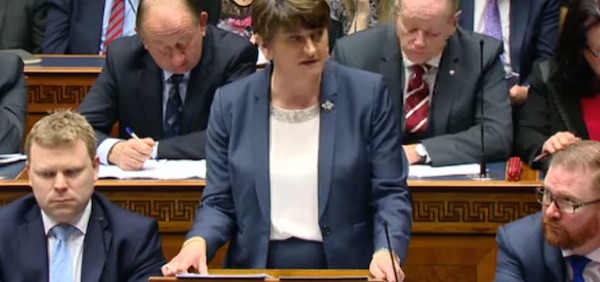
The futures of both DUP First Minister Arlene Foster and Sinn Fein Deputy First Minister Martin McGuinness are in the balance after a farcical power-play at Stormont this week.
Foster has accepted responsibility but has shown no remorse for the latest corruption scandal, the full details of which have still not been revealed, but which heavily rewarded those who burned wood pellets for the purpose of heating buildings in an unlimited manner.
Foster has shown no remorse for a financial scandal which has apparently enriched hundreds of loyal DUP supporters and funders, the full details of which have still not been revleaed, but heavily rewarded those who burned wood pellets for the purpose of heating buildings in an unlimited manner.
The RHI (‘Renewable Heat Incentive’) appears to have enriched hundreds with links to the DUP, costing up to 490 million pounds in public funds obtained through austerity cutbacks in areas such as health and social services.
If Foster does not step aside and continues to defy public outrage, there will be pressure on McGuinness to stand down himself, thereby terminating the Sinn Fein-DUP coalition administration in the Six Counties and forcing a new election.
On Monday, aided by the hopelessly biased DUP Assembly Speaker, Foster sought to justify her handling of the ‘cash-for-ash’ scheme to an almost empty chamber after the other political partties walked out. The DUP leader said she accepted that accountability for the scheme’s failings stopped with her, but lambasted the other parties for their walk-out and said the motion to bring her down was “doomed”.
The north’s largest unionist party then used their veto under the St Andrew’s Agreement to vote down a no confidence motion, despite losing the actual vote. Foster also defied calls to allow an independent judicial investigation and mocked her political opponents as “impotent”.
In the end, Sinn Fein made a limited contribution to the subsequent debate and did not take part in the no confidence vote. Mr McGuinness said his request to Mrs Foster to stand aside was friendly advice rather than an instruction, and did not indicate any threat of elections. His party is to bring a substantive motion on the issue when the assembly resumes.
Although Sinn Fein warned of “grave consequences” if Foster acted unilaterally to deliver her statement after Martin McGuinness withdrew approval for it, the Deputy First Minister also said it was important the Six County Executive “find a way forward”.
“I have been part of these institutions since the DUP came into them almost 10 years ago and we have been through some very difficult and very challenging times - and I mean really difficult and challenging times - and I think I have been to the forefront of ensuring that these institutions, that I regard as peace institutions, continued to deliver for people and continued to deliver for the peace process,” Mr McGuinness said.
“So what we have to do in the time ahead is not speculate about what could be a very bad outcome. My efforts are bent towards getting a good outcome.”
Despite an official campaign to increase public confidence in Stormont, routine corruption scandals have destabilised the peace process and have now made public pressure for change impossible to ignore.
January 16 represents a deadline, when Sinn Fein will introduce a motion calling on Foster to stand aside over her handling of the cash-for-ash scandal and to permit an independent judicial investigation. In the event she clings on, McGuinness will come under pressure to force new elections by stepping down as Deputy First Minister.
But Sinn Fein Assembly member turned commentator Daithin Mr McKay has suggested an even more significant “changing of the guard” could be taking place, possibly in connection with Mr McGuinness’s ill-health, to bring forward a new leadership for Sinn Fein at Stormont.
He said Sinn Fein strategy in the 26 Counties “requires stable government in the north. That political strategy may now have to take a hit for the party’s own credibility.”
He added: “McGuinness has been in post for almost 10 years, served alongside three different DUP First Ministers and demonstrated rationality and patience throughout. A patience and resolve that was required to bed the institutions down. His successor may not show the same forbearance.”
![[Irish Republican News]](https://republican-news.org/graphics/title_gifs/rn.gif)
![[Irish Republican News]](https://republican-news.org/graphics/title_gifs/harp.gif)

